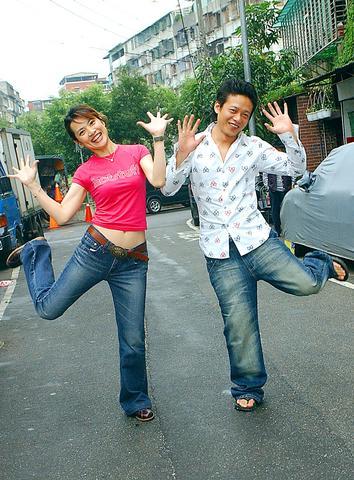So, you still think Tsai Ming-liang's (
Last week in Kaohsiung during the last few takes of shooting, Tsai's favorite actor Lee Kang-sheng (
Chen Shiang-chyi (

PHOTOS: SHEN CHAO-LIANG, TAIPEI TIMES
As for actress Lu Yi-ching (
"This is going to be a lively and bustling movie and I think it will be a breakthrough for myself in terms of a film style," Tsai said.
He is a fanatic fan of 1930s Mandarin pop songs from artists like Grace Ge (

The story of Wayward Wind, which has just finished shooting, is an extension of Tsai's 2001 feature What Time is it There? (
Chen Shiang-chyi's character meets watch vendor Lee Kang-sheng's character on a skywalk in Taipei before she leaves for Paris. A strange longing grows between the two when she is away. But when Chen returns to Taipei, the skywalk is gone and she does not know how to find Lee, who has lost his job as a vendor and has become a porn actor.
The narrative is not chronological, Tsai said. "It will not be a realistic film in terms of space and time ... In terms of acting, I also give the actors more latitude, this time."
For the actors, nudity was an issue, though Lee said, "I don't need to watch more porn films to find out more [about the life of porn stars]. I've already seen a lot of them."
Like Tsai's previous films, Wayward Wind is partly funded by investors in France. The NT$18 million budget movie is co-financed by French TV station Arte and Centre National de la Cinematographie, in cooperation with Taiwan's Subsidy For Film Production (
So, will this new film have more dialogue than Tsai's last movie, Goodbye, Dragon Inn (

April 14 to April 20 In March 1947, Sising Katadrepan urged the government to drop the “high mountain people” (高山族) designation for Indigenous Taiwanese and refer to them as “Taiwan people” (台灣族). He considered the term derogatory, arguing that it made them sound like animals. The Taiwan Provincial Government agreed to stop using the term, stating that Indigenous Taiwanese suffered all sorts of discrimination and oppression under the Japanese and were forced to live in the mountains as outsiders to society. Now, under the new regime, they would be seen as equals, thus they should be henceforth

Last week, the the National Immigration Agency (NIA) told the legislature that more than 10,000 naturalized Taiwanese citizens from the People’s Republic of China (PRC) risked having their citizenship revoked if they failed to provide proof that they had renounced their Chinese household registration within the next three months. Renunciation is required under the Act Governing Relations Between the People of the Taiwan Area and the Mainland Area (臺灣地區與大陸地區人民關係條例), as amended in 2004, though it was only a legal requirement after 2000. Prior to that, it had been only an administrative requirement since the Nationality Act (國籍法) was established in

Three big changes have transformed the landscape of Taiwan’s local patronage factions: Increasing Democratic Progressive Party (DPP) involvement, rising new factions and the Chinese Nationalist Party’s (KMT) significantly weakened control. GREEN FACTIONS It is said that “south of the Zhuoshui River (濁水溪), there is no blue-green divide,” meaning that from Yunlin County south there is no difference between KMT and DPP politicians. This is not always true, but there is more than a grain of truth to it. Traditionally, DPP factions are viewed as national entities, with their primary function to secure plum positions in the party and government. This is not unusual

The other day, a friend decided to playfully name our individual roles within the group: planner, emotional support, and so on. I was the fault-finder — or, as she put it, “the grumpy teenager” — who points out problems, but doesn’t suggest alternatives. She was only kidding around, but she struck at an insecurity I have: that I’m unacceptably, intolerably negative. My first instinct is to stress-test ideas for potential flaws. This critical tendency serves me well professionally, and feels true to who I am. If I don’t enjoy a film, for example, I don’t swallow my opinion. But I sometimes worry